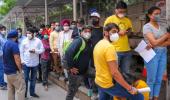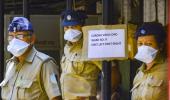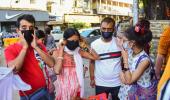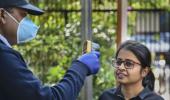The Chinese city of Wuhan, the epicentre of the novel coronavirus, reported just one confirmed case on Monday as the deadly COVID-19 gradually abated but 13 people died in the country taking the death toll so far to 3,226, Chinese health officials said on Tuesday.

Wuhan along with the entire Hubei province with over 50 million people was kept under total lockdown since January 23 banning all movement of transportation after the virus first emerged in December.
The Chinese city of Wuhan reported one new confirmed case of the COVID-19 and 12 deaths on Monday, the provincial health commission said on Tuesday.
The latest report brought the total confirmed cases of the virus in the Hubei province to 67,799.
Among the 8,004 hospitalised patients, 2,243 were still in severe condition and another 539 in critical condition, it said.
As the virus began to abate in its worst affected areas, Wuhan and Hubei province, China on Monday announced plans for an orderly withdrawal of thousands of medical staff deployed there while a top medical expert said the coronavirus outbreak has "almost seen its end" in the country but a final judgement would be made after a month.
China's National Health Commission said 21 new confirmed cases of the novel coronavirus infection and 13 deaths were reported on the Chinese mainland on Monday.
Of the deaths, 12 were in Hubei province and one in Shaanxi province, it said.
Meanwhile, 45 new suspected cases were reported, the commission said.
The overall confirmed cases on the mainland have reached 80,881 by the end of Monday.
This includes 3,226 people who died of the disease, 8,976 patients who were still being treated, 68,679 others discharged after recovery.
The commission said that 128 people were still suspected of being infected with the virus.
Meanwhile, 20 imported cases were reported on the mainland on Monday taking the total to 143. Beijing reported nine imported cases.
As of Monday, 157 confirmed cases, including four deaths, have been reported in Hong Kong, 11 confirmed cases in the Macao SAR, and 67 in Taiwan including one death.
The virus that first emerged in China's Wuhan city in the Hubei province in December last year has spread to 155 countries, infected 182,405 people and has claimed 7,154 lives, according to the Johns Hopkins Coronavirus tracker.
A leading Chinese official group, headed by Premier Li Keqiang, suggested orderly withdrawal of the medical staff supporting virus-hit Hubei province for which Wuhan is the capital.
China deployed over 30,000 medical personnel, including staff from the military, and built 14 makeshift hospitals at the height of the coronavirus outbreak in January.
The makeshift hospitals have been dismantled.
The leading group asked officials to ensure high-level treatment of severe COVID-19 patients in Wuhan while withdrawing the supporting medical teams, state-run China Daily reported.
Meanwhile, Cao Wei, deputy director and associate chief ;physician of the department of infectious diseases of Peking Union Medical College hospital, said the deadly coronavirus which brought China to a grinding halt for about three months has "almost seen its end".
"Currently, after three months of the fight, the (virus) outbreak in China, which started in last December has almost seen its end," said Cao.
"We will still wait for another month to see and make the final judgement," Cao, who was in Wuhan directing mammoth medical operations to fight the disease, told an online media briefing.
She also said that no data has been found to indicate the relationship between the novel coronavirus and the weather.
"We all know WHO declared it as a pandemic a few days ago. It means the situation globally will not solely depend on China or any other single county," Cao told online media briefing from Wuhan adding that China would take a call on it in about a month.
Asked whether China apprehends a second wave of the virus, she said the relapse of the COVID-19 epidemic in China "would not be a great concern under the current prevention and control measures."
She said the number of newly reported cases of coronavirus in the country, including imported ones might stay at a relatively low level, but it would last for a certain period of time as the imported cases have become an important source of COVID-19.
Cao also said there is no evidence to show that the virus would abate with the onset of summer and the resultant rise in temperatures, ruling out the prevailing view that summer heat would subdue the virus.
There is no data about COVID-19 relevance to the weather pattern.
"The impact of the weather on COVID-19 has not been confirmed yet," Cao said.










